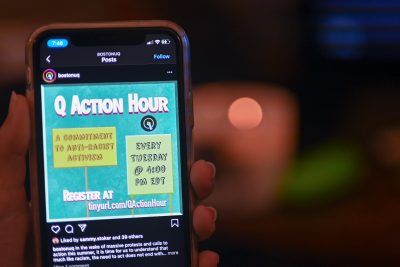This summer has seen rising calls to action against police brutality and systematic racism in the United States, and months into the semester at Boston University, these efforts continue.

Weekly Action Hours hosted by BU’s Queer Activist Collective aim to hold people in power accountable and demand change. Every Tuesday at 4 p.m., attendees over Zoom are encouraged to contact legislators, district attorneys and police departments demanding justice for victims of police brutality.
Q also provides resources, such as scripts, to help members feel comfortable reaching out to representatives. Toward the end of the hour, the group checks in with students to discuss their motivations for participating in advocacy work.
Ryan de Kock, Q’s director of operations and a junior in the College of Arts and Sciences, started calling legislators on his own this summer in response to the heightened awareness of racial injustice in America. Because Q advocates for LGBTQ rights and inclusion, de Kock said it only made sense to confront racism.
“If we’re a queer activist group, that’s our name, it’s incredibly important that we aren’t just
fighting for the rights of white queer people,” de Kock said. “We need to actively address the ways in which we contribute to white supremacy.”
CAS senior Rhiannon Gaylord, Q’s public relations coordinator, said college-level administrations often uphold antiquated, harmful systems, but that Action Hour seeks to combat that.
“Universities in general do a great job of perpetuating all sorts of injustice and oppression,” Gaylord said. “They have to be committed to consistently taking action and listening to marginalized people and supporting them in whatever way they can.”
De Kock looks to local and national social justice organizations for resources to formulate a loose agenda for Action Hours. He said one recent action item supported a bill that would make phone calls free for prison inmates in Massachusetts — an issue all the more relevant with COVID-19 visitation restrictions, he said.
The last event hosted a representative from Black and Pink, an LGBTQ prison abolition nonprofit, who encouraged Q members to support a bill that would allow for the collection of data on LGBTQ inmates in restricted housing.
Q President Christa Nuzzo, a CAS junior, said dialogue around race-based injustice and violence is often not addressed where it should be, such as at BU. Nuzzo said the University’s Day of Collective Engagement sparked important discussions, but failed to follow up.
“Those conversations didn’t really continue in a lot of places where they should have continued,” Nuzzo said. “BU should be providing more resources on how to be a better ally, which is definitely one of Q’s goals.”
The organization is hosting a second LGBTQ+ POC Ally Training, after an earlier training in July. Participants are encouraged to attend one or both of two sessions on Nov. 10 and 12 from 7–8 p.m.
There was a consensus among Q’s executive board members that queer activism is linked with racial justice advocacy. Because transgender women of color spearheaded gay liberation, Nuzzo said the two movements are interconnected.
“One of my favorite quotes is by Emma Lazarus, who said, ‘Until we are all free, we are none of us free,’” Nuzzo said. “As a queer person of color myself, I’m living in both movements, and I don’t believe it’s possible to fight for one but not the other.”
Q leaders said they recognize this work is indirect action, and not as immediately effective as direct action. However, Gaylord said they hope making advocacy accessible will attract people to consistently advocate for social change.
“Obviously it’s not a huge, hard thing we’re doing,” Gaylord said. “A lot of people are making huge sacrifices, but even those little hurdles, giving people a way to get over them, I think, can be important for inspiring these little actions and building up to bigger, more fundamental change.”























































































































